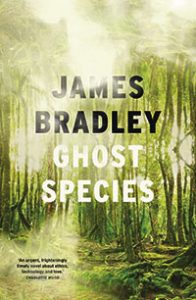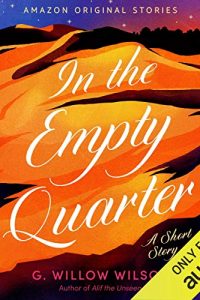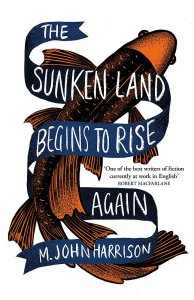Ian Mond & Gary K. Wolfe Review Ghost Species by James Bradley
 Ghost Species, James Bradley (Hamish Hamilton 978-1-926-42866-6, AU$29.99, 320pp, tp), April 2020.
Ghost Species, James Bradley (Hamish Hamilton 978-1-926-42866-6, AU$29.99, 320pp, tp), April 2020.
REVIEW BY IAN MOND
Back in February, Jeff Bezos earmarked ten billion dollars for the establishment of the “Earth Fund.” He joins fellow billionaire philanthropists Michael Bloomberg and Bill and Melinda Gates in throwing large sums of money at the climate crisis. While it’s questionable whether these acts of rich-people tokenism will play any role in saving the planet, James Bradley, in his new novel Ghost Species introduces us to his version of the billionaire entrepreneur hoping to save the world. Dave Hucken, a hybrid of John Hammond, Elon Musk, and Mark Zuckerberg, has constructed a facility – the Hucken Foundation – deep in the forests of Tasmania. Kate Larkin and her partner Jay Gunasekera, two leading geneticists, are invited to join the Foundation, though it’s only on their arrival, having signed non-disclosure agreements, that they discover the true purpose of the facility. With the pronouncement that human civilisation is at an end, Hucken explains that he and his team plan to re-engineer the environment by not only introducing flora that adapts and is more tolerant to rising temperatures, but also – Jurassic Park-style – by resurrecting new species. Hucken’s ambition isn’t limited to woolly mammoths and dodos: as he explains to Kate and Jay, he intends to bring life back to early humans, such as the Neanderthals. In full megalomaniacal mode Hucken tells the couple:
We need to be tested by other minds, other perspectives. We need to learn how other eyes see the world. Think what we could learn from them, from their minds! Imagine speaking to another species!
Kate has grave misgivings. She questions Hucken’s right to play God, but also whether the child born from this genetic experiment will be “protected by the law… have the same rights of self-determination as a normal child.” In the end, her own conflicted feelings toward Jay, and their attempts at having a child, feed into her reluctant decision to assist in the project. But with the birth of Eve, Kate realises her initial fears are very much founded and that, unless she acts, Eve will likely spend most of her life in a laboratory.
Through both his fiction and non-fiction, Bradley has been a passionate and outspoken advocate for the environment. In 2015, with the publication of his fourth novel Clade, he brilliantly explored the impending climate crisis – extreme weather events, climate refugees, and the widespread disappearance of flora and fauna – by following one family across three generations. Of his non-fiction, in 2018 Bradley penned an extraordinary essay, “An Ocean and an Instant” for the Sydney Review of Books (you can still read it online), where he discussed extinction and climate change through a very personal lens – his upbringing in Adelaide and the recent death of his father. Like that essay, Ghost Species is an intimate work that contrasts the bond between a mother and daughter with humanity’s long-standing apathy toward the environment. The novel’s high-tech set-up is a marvellous bit of rug-pulling, a refutation of the idea that we can engineer ourselves and the species out of the disaster we seem hell-bent on racing toward. Unlike Kim Stanley Robinson, who – while horrified by Government’s inaction – views the catastrophe of climate change in New York 2140 as an opportunity for the survivors to consider new ways of dealing with the excess of capitalism, for Bradley there is no real future for the species once the temperature climbs beyond 1.5 degrees. The dystopia he sketches out in this novel, and for which he provides a full colour treatment in Clade, is one where civilisation is irreparably broken, where even subsistence living has little chance of success. As pessimistic as that sounds – and let’s be clear, it is; Bradley does not sugar coat – what’s beautiful about Ghost Species is that Bradley recognises the best elements of humanity. Kate’s decision to flee the Foundation with Eve is an act borne out of courage and love, while her friendship with Yassamin – one that requires a large dollop of trust in a broken world – is a reminder that kindness and compassion are free of charge. As for Eve, she is a remarkable character, a young woman dealing with a dual heritage, who faces the sort of hatred and suspicion that homo sapiens have made an art-form since we became the dominant species on the planet. Her layered characterisation owes a lot to Bradley’s recent young-adult series (the Change Trilogy), which features a teenaged female protagonist, the lovely and resourceful Callie.
Ghost Species puts lie to the idea – recently expressed by the Prime Minister of Australia – that in responding to climate change, we need to focus more on resilience and adaptation. While Bradley’s climate fiction puts people first, an emphasis on characters who are brave, principled and compassionate, the key message of Ghost Species and Clade is that if we don’t act (and soon) there will be no billionaire entrepreneurs left to resurrect homo sapiens from the devastation we have wrought.
-Ian Mond
REVIEW BY GARY K. WOLFE
As far as I know, James Bradley’s novels have never been marketed as science fiction, even though Clade remains one of the more credible and disturbing visions of how worldwide climate change might unfold over the next few decades. One reason might be that he sometimes explores different genres and narrative modes in the same novel, as he did with Clade, and as he does again with Ghost Species, a novel whose evocative title cleverly and subtly shifts meaning throughout the course of the narrative. The novel begins with the tone of a Michael Crichton paranoid thriller, as geneticists Kay Larkin and Jay Gunasekera are mysteriously summoned to a secretive high-tech lab complex in remote Tasmania, where they learn their host is tech billionaire Davis Hucken, a figure combining the most hubristic aspects of Elon Musk, Mark Zuckerberg, and Bill Gates. Among his idealistic projects are various repositories for preserving genetic and cultural material in the face of possible global catastrophe and a project to “de-extinct” various species like thylacines, mammoths, and aurochs, reintroducing them to their once-native environments in hopes of making those endangered environments more sustainable. We could hardly be blamed at this point for thinking we’ve stumbled into yet another what-could-possibly-go-wrong cautionary tale, a sort of Pleistocene Park with Jeff Goldblum wandering in from stage left at any moment. But that is not at all where Bradley is going with this novel.
The immediate project for which Kate and Jay are recruited is the most morally dubious of Hucken’s schemes: the re-creation of a Neanderthal child. Despite plenty of doubts, they sign on, rationalizing their own hubris with the argument that always seems to underlie such compromises with principle: if they don’t do it, someone else will, and not as well. A surrogate is found and implanted, the child is born, and the novel switches gears from high-tech thriller to distinctly low-tech fugitive survival tale. Horrified that the child faces a life as an institutionalized lab animal, Kate abducts her and goes on the lam, successfully (she thinks) hiding out for years in a series of dismal motels and rental homes as the child – not surprisingly named Eve – grows into adolescence, uncomfortable about her differences with the few other children she meets, but unaware of her true origins. During this time, Kate finds herself developing a cautious and tentative friendship with an Iranian refugee named Yassamin and her son Sami, dealing with her long-alienated mother, and learning that Jay has essentially cast his lot with Hucken’s corporate empire.
As the novel switches mode yet again, though, a theme which has been thrumming like a pedal point throughout the narrative rises to the surface in dramatic fashion. Early on, we’re told that Hucken’s elaborate preservation and restoration projects are partly in preparation for an “extinction-level event,” and a few unsubtle hints are dropped about the larger world outside Tasmania: “bird numbers are in freefall, insect populations and ocean ecosystems are collapsing,” says Hucken. “We’re not at a tipping point, we’re past the tipping point. The world we knew, it’s over. Our civilization is already dead.” Much of Tasmania itself is on fire, in a manner pointedly evocative of Australia’s recent plight. Whole species of insects, reptiles, amphibians, and fish are simply disappearing, while increasing earthquakes may be related to the loss of Antarctic ice, winter almost disappears, and storms grow stronger. Eventually we even learn that in the US, cities like Miami, New Orleans, and Long Beach are “all gone.” This takes us toward the territory of Bradley’s Clade, but on a far more intimate scale than that generation-spanning novel. By focusing on Kate, and eventually on Eve, Bradley makes the telling point that we might easily find ourselves trying to survive in a post-apocalyptic world without having personally suffered any particular apocalyptic event, and that the very notion of survival can shift meaning suddenly and unexpectedly. What began looking like a kind of biotech thriller ends up on the elegiac, almost mournful note of classic novels like Stewart’s Earth Abides, leaving us wondering if the ghost species of the title might come to include not just the aurochs and thylacines. Ghost Species is a brilliantly modulated novel, but also a confrontational one, forcing us to ask not just what is possible, but what may be inescapable.
–Gary K. Wolfe
Gary K. Wolfe is Emeritus Professor of Humanities at Roosevelt University and a reviewer for Locus magazine since 1991. His reviews have been collected in Soundings (BSFA Award 2006; Hugo nominee), Bearings (Hugo nominee 2011), and Sightings (2011), and his Evaporating Genres: Essays on Fantastic Literature (Wesleyan) received the Locus Award in 2012. Earlier books include The Known and the Unknown: The Iconography of Science Fiction (Eaton Award, 1981), Harlan Ellison: The Edge of Forever (with Ellen Weil, 2002), and David Lindsay (1982). For the Library of America, he edited American Science Fiction: Nine Classic Novels of the 1950s in 2012, with a similar set for the 1960s forthcoming. He has received the Pilgrim Award from the Science Fiction Research Association, the Distinguished Scholarship Award from the International Association for the Fantastic in the Arts, and a Special World Fantasy Award for criticism. His 24-lecture series How Great Science Fiction Works appeared from The Great Courses in 2016. He has received six Hugo nominations, two for his reviews collections and four for The Coode Street Podcast, which he has co-hosted with Jonathan Strahan for more than 300 episodes. He lives in Chicago.
These reviews and more like them in the April 2020 issue of Locus.
 While you are here, please take a moment to support Locus with a one-time or recurring donation. We rely on reader donations to keep the magazine and site going, and would like to keep the site paywall free, but WE NEED YOUR FINANCIAL SUPPORT to continue quality coverage of the science fiction and fantasy field.
While you are here, please take a moment to support Locus with a one-time or recurring donation. We rely on reader donations to keep the magazine and site going, and would like to keep the site paywall free, but WE NEED YOUR FINANCIAL SUPPORT to continue quality coverage of the science fiction and fantasy field.








